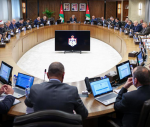You are here
Is this the final chapter: The state and the Islamists in Jordan?
Apr 27,2025 - Last updated at Apr 27,2025
There has been considerable confusion in media and political coverage regarding the Jordanian government's recent decision to ban the activities and operations of the historical Muslim Brotherhood group. This confusion stems from the mistaken belief that the decision is new, whereas it is actually based on an old judicial ruling. Moreover, there has been deliberate media exaggeration by both opponents and supporters of the Brotherhood, portraying it as a complete shutdown of the "Islamic movement" in Jordan, including the activities of the 31 MPs from the Islamic Action Front (IAF) Party, and even the party itself. Some have gone as far as suggesting scenarios such as the dissolution of parliament and the abandonment of the political modernization project altogether. However, all these claims are inaccurate and far removed from the essence, implications, and broader political consequences of the decision.
The decision to ban the activities of the Muslim Brotherhood has deep historical roots and contexts. A major part of it, notably, is linked to internal crises within the Brotherhood itself. The internal rift between the “doves,” led by historical leaders of the Brotherhood, and the “hawks,” escalated at a time when a new law regulating associations required all organizations to relicense themselves under new standards. In 2015, under the control of the hawks' faction, the Brotherhood rejected re-licensing, whereas the doves believed legal re-licensing would protect the movement. Indeed, one of the Brotherhood’s historical leaders and former General Supervisor, Abdel Majid Thneibat, went ahead and legally registered a new association under the name "The Muslim Brotherhood" and invited his fellow members to join. However, they refused, and instead expelled him along with a large number of the doves' supporters. Concurrently, other prominent leaders like Salem Falahat, Raheel Gharaibeh, and Nabil Koufahi left the Brotherhood and established new political parties, as the internal crisis reached unprecedented levels, especially after the downfall of the Brotherhood's rule in Egypt in 2013.
In 2020, after years of legal battles, the Court of Cassation issued rulings to confiscate the Muslim Brotherhood’s properties and affirmed that the old Brotherhood was an illegal entity. These rulings sparked debates within the Brotherhood between a faction advocating for compliance with the law and joining the legally licensed Brotherhood or focusing solely on the Islamic Action Front party (the centrist faction), and another faction insisting on maintaining the original Brotherhood’s existence, albeit in an unlicensed and clandestine manner—operating out of homes or unofficially from some of the IAF’s offices. For the first time in the Brotherhood’s history, internal elections were conducted in extreme secrecy, with announcements made later about new leadership, while the government chose not to intervene, continuing its traditional containment strategy.
The Islamic Action Front Party, informally aligned with the Brotherhood, contested the last parliamentary elections and achieved the highest number of votes in the Brotherhood's history in 2024. This did not alter the state institutions' stance, although tensions escalated following Israel's genocidal war and the subsequent political mobilization in the Jordanian streets. The final straw came with the exposure of groups implicated in illegal weapons possession, most of whom were affiliated with or close to Brotherhood circles, prompting the government to put an end to the previously tolerated illegal activities by formally banning the Brotherhood’s operations, while refraining from targeting the political party that represents the Brotherhood and whose members largely hail from its ranks, maintaining significant parliamentary presence.
The Jordanian government's decision, by no means, implies replicating other Arab models where the Brotherhood and its political arms were labeled as terrorist organizations, resulting in mass imprisonments and criminalization of any affiliation or even sympathy towards the group. Jordan’s policy is far from this path. Rather, the decision aims to ensure that political activities are conducted under the law, transparently, and in accordance with the formal rules of political engagement. This approach might even benefit the Islamic movement in the long run, pushing it toward greater political realism and open, lawful operations—moving away from the dualities that had long plagued the Islamic movement and led to internal crises.
Clarity, transparency, and legal, public political work present a much wiser and more sustainable model compared to past practices. It is better to consider that we have entered a new phase in the relationship between the state and the Islamists—a historical opportunity to build trust, address many outstanding issues, and organize the relationship under clear and specific frameworks.
Mohammad Abu- Rumman is the Academic Advisor of Politics and Society Institute in Amman














Add new comment